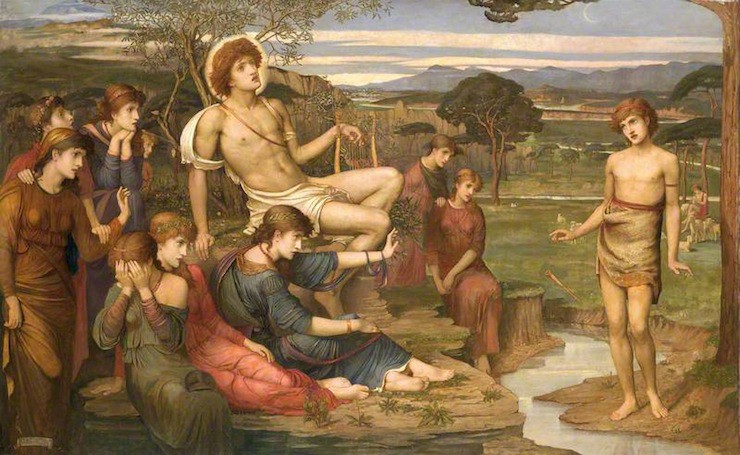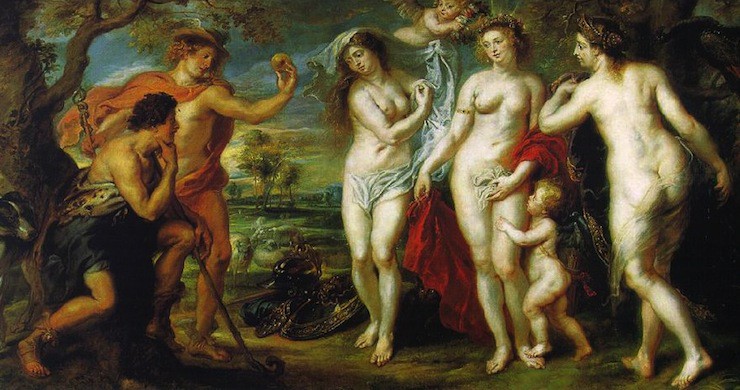Jo Walton’s The Just City and its sequel, The Philosopher Kings, posit a world in which the ancient Greek pantheon of gods is real, and exists outside of time. Athena is therefore able to establish a Utopian city based on Plato’s Republic centuries before Plato ever writes it, populated by mortals (and one incarnate god) from a wide swath of history.
But as grateful as the Masters and Children of the city are to have a bona fide goddess on their side, perhaps they’d better brush up on their mythological history. Because the Greek gods? Nothing but trouble.
In The Philosopher Kings, Apollo warns his mortal children that everything a god does will one day be written in song, meaning that there is at least a grain of truth to most of the myths we’ve heard about them. Case in point: Apollo’s pursuit of the water nymph Daphne kicks off the events in The Just City, as Apollo struggles to understand why she prayed to become a laurel tree rather than give herself to him—I know, I know, but gods are pretty self-involved and to his credit he does eventually figure it out… Anyway, there are subtler references to other tales sprinkled throughout Walton’s world-building that can send you down a rabbit hole of bizarre mythology in which humans tend to get the raw end of the deal when mixing with the gods.
So if you wind up in Athena’s version of the Republic, or find yourself caught up in any other Olympian schemes, I’ve got some advice for you…
Never Trash Talk a Goddess

Learn from the mistakes of Arachne, a great weaver who boasted that her skills surpassed even those of Athena, whose hobbies include the pursuit of knowledge, drafting unbeatable battle strategies, and making kick-ass centerpieces—the Martha Stewart of ancient Greece. Not one to back down from a fight, Athena agrees to a tapestry-weaving contest. In Ovid’s Metamorphoses, Arachne’s work is actually judged to be better, but she insults Athena by depicting the gods abusing and misleading mortals. Athena has a bit of a temper tantrum and, in an ironic twist worthy of The Twilight Zone, transforms Arachne into a spider, cursing her and her descendants to weave… forever.
Remember: Gods ALWAYS Bend the Rules

In a similar tale, the musician Marsyas—alternately a human or a satyr in retellings—boasts about his skill with the aulos, a double-flute supposedly discarded by Athena. In his hubris, Marsyas challenges Apollo—the god who invented music, like COME ON, Marsyas—to a music contest in which the winner would choose the punishment for the loser. Marsyas initially wins the judges over with his performance, but when Apollo plays a second time, the god shows off by turning his instrument upside down and still playing flawlessly. When Marsyas can’t repeat the same skill on his flutes, he’s judged the loser. And his punishment? Apollo flays the man alive, in some versions making a wine skin from his hide. Gross.
Seriously, Stop Insulting the Gods Already

Worse still is the story of Niobe, wife of the ruler of Thebes. During a celebration in honor of Leto, Niobe insinuates that the goddess is only worshiped for having birthed a measly two children, and that therefore Niobe should be revered for having fourteen children of her own. But Leto’s children are the Olympians Apollo and Artemis, and to defend their mother’s honor, they slaughter Niobe’s children in front of her. Yikes. Niobe flees to her birthplace near Mt. Sipylus and there weeps constantly until the gods turn her to stone, either out of pity, or, I suspect, because they were super bored with her. In some versions one of Niobe’s children is spared, but suffers from such intense PTSD after witnessing the deaths of her brothers and sisters that she turns permanently pale.
Never Trust a Divine Suitor

Even among the Greek gods, Zeus is a notorious womanizer—like James Bond but with awesome cosmic powers. He often transforms himself to “seduce” his lovers—notably appearing as a swan, a bull, and a shower of golden rain—but he also occasionally uses his powers to hide the evidence of his extramarital affairs. One of his mortal conquests was Io, a priestess of Hera—which is a shockingly bad idea when you remember that Zeus is married to Hera. Zeus disguises Io as a cow, but Hera isn’t fooled—because who keeps a cow in the bedroom?—and after first demanding the lady-cow as a gift, sends a gadfly to repeatedly sting the poor woman as she wanders the world. She eventually comes to rest in Egypt, where Zeus restores her to her human self and she can finally give birth to Zeus’ lousy children.
Don’t Count on Sympathy

Zeus occasionally turns his amorous attentions to the mortal votaries of other gods, ignoring all the rules of proper manners when it comes to maintaining good relationships among the Olympians. It’s good to be the King, but it’s significantly less good to be Kallisto, a follower of Artemis and devotee of virginity. In order to approach her, Zeus disguises himself as Artemis (ew) and lures Kallisto into the woods, only revealing himself once he has embraced her. When the real Artemis discovers the transgression, she punishes the pregnant Kallisto by transforming her into a bear and setting her loose in the forest, where she gives birth to Arcas. The boy grows up unaware of his parentage and becomes a great hunter as an adult. This being Greek mythology, Arcas later encounters his bear-mother in the woods and—because he has no reason to recognize her—kills her with an arrow. Even Zeus feels a bit sheepish about this one, and honors mother and son with the constellations Ursa Major and Ursa Minor.
Don’t Play Favorites

We could be here all day debating the precise events that led to the mytho-historic Trojan War, but in nearly every instance it comes down to the gods’ interference. In his Histories, Herodotus traces it as far back as Zeus’ abduction of Io, whose descendants include Herakles and other heroes of the War. But the pieces didn’t really start to fall into place until the wedding of Peleus and Thetis, where Eris—an uninvited divine guest—produces a golden apple as a gift for the “fairest” of the attendant goddesses. This naturally sparks a petty debate between Hera, Aphrodite, and Athena, which Zeus smartly sidesteps by forcing the mortal prince Paris to judge instead. What are this kid’s qualifications, anyway? Well, never mind. Each goddess attempts to bribe Paris: Hera offers political power, Athena offers wisdom and glory in battle, and Aphrodite—shrewdest of them all on this point—promises him the love of the most beautiful woman in the world. Paris of course chooses Aphrodite, but there’s one small problem: the famed beauty Helen is already married to the King of Sparta. Paris abducts her anyway and carries her back to Troy with a fleet of Greek ships on his heels. Whoops.
The Dead Stay Dead

Apollo’s son Orpheus inherited his father’s gift for music, and charmed everyone he met. He was happily wed to Euridike until another of Apollo’s children, Aristaeus, is overcome with lust for her and chases her through the wood. She evades him (yay!), but steps on a viper and dies instantly when it bites her (boo!). Orpheus travels to the Underworld in an attempt to retrieve Euridike’s soul, using his song to convince Hades to let her return to the world of the living. But there’s a catch: Orpheus must walk in front of her and not look back until both have reached the upper world. Orpheus is overjoyed, but begins to doubt Hades’ word and turns back at the last moment, only to watch Euridike disappear forever. In Plato’s account, Hades never intended for Euridike to escape and sent only an apparition meant to torment Orpheus, believing that the hero should have been willing to die to be with his love rather than foolishly—and cowardly—attempting to return her to life.
If You Can’t Beat ‘Em, Join ‘Em

Luckily, it’s not ALL bad news for the mortals. The legendary founder of Mycenae, Perseus is the first of eight(ish) semi-divine heroes in the Greek pantheon. Challenged to slay the Gorgon Medusa by his mother’s unsavory new suitor, Perseus seeks the help of Athena, who guides the hero to several legendary items—a mirrored shield, Hermes’ winged sandals, and a sweet new sword—to aid in his journey. And after killing Medusa and evading the other Gorgons, Perseus even finds time for a side quest to rescue Andromeda from both the sea monster Cetus and her awful parents. LEVEL UP!
Real-life cults sprang up that worshiped Perseus as a full-fledged god for his heroic exploits, and even the less savory heroes like Theseus (who abandoned his wife) and Herakles (who had a bit of a temper…) became minor gods with their own followers and areas of influence. So if you’ve got the chops (i.e., divine parentage), you might as well try to become one of the ruling class—although you might wind up with a whole new set of problems on Olympus.
Sarah Tolf is the production assistant for Tor.com, and plans to stay as far away from ancient gods as possible. She loves all the art in this post, but has a special place in her heart for that sassy Muse warning Marsyas to back up. She stopped updating her Twitter ages ago, but you can follow her anyway.










